Main Menu
Traditional knowledge is gaining increasing recognition due to its close ties with ecosystem conservation and the resilience of local communities. Once overlooked, these indigenous knowledge systems are now considered essential to the sustainable management of biodiversity.
This study seeks to document indigenous knowledge and sacred cultural expressions related to mangrove conservation in the Sine-Saloum and Casamance Deltas, with the aim of integrating them into the planning and management strategies of Marine Protected Areas (MPAs) and Territories of Life (Indigenous and Community Conserved Areas - ICCAs).
The methodology combines environmental socio-anthropology with gender theory. A qualitative survey was conducted with 338 participants, including 22 semi-structured interviews and 30 focus group discussions.
Findings reveal that traditional knowledge is intimately linked to sacred rituals surrounding bolongs (tidal channels) and mudflats, including a localized zoning system for resource use. Notable examples include the sacred bolongs of Nkololah, Kiling Kiling, and Keuwéuy, and the presence of totemic beliefs protecting entire species such as the manatee and the hyena.
Other practices involve the protection of certain areas through fetish installations, such as the Khitong/Hitong/Houbene among the Diola people and the Kankourang among the Mandinka, with social sanctions imposed in cases of violation. Additionally, traditional sustainable harvesting tools, such as the Moundé basket used for the regulated collection of Anadara senilis (a species of ark clam), illustrate low-impact techniques passed down through generations.
This study highlights key community-based management strategies that provide a strong foundation to advocate for the integration of traditional knowledge into environmental governance and conservation policies in Senegal.
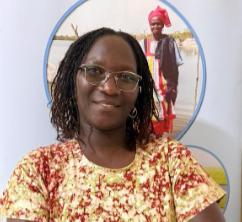
A trained biologist, Dr. Sanou Ndour holds a Ph.D. in Knowledge, Conservation, and Valorization of Biodiversity from Cheikh Anta Diop University (UCAD) in Dakar. Before joining the IUCN-PACO Regional Office as Biodiversity Specialist for the Natur’ELLES Project, Dr. Ndour served as Project Associate for Monitoring, Evaluation, and Learning at Wetlands International Africa. She also held several roles within the same organization, including Research Consultant for the West Africa Marine Turtle Survival Project.
Throughout her career, she has led the implementation of projects focused on the conservation of marine and coastal ecosystems in the West African sub-region. She brings extensive experience in wetland management and strengthening the resilience of local communities that depend on biodiversity.
Traditional knowledge plays an essential role in natural resource management and is a cornerstone for establishing inclusive and participatory governance systems. The implementation of nature-based solutions (NbS) provides a unique framework for integrating traditional and local knowledge into the governance and management of natural resources.
In this context, Cégep de la Gaspésie et des Îles, in partnership with PRCM (Partenariat Régional pour la Conservation de la zone côtière et marine en Afrique de l’Ouest), has undertaken a study to document and promote traditional and local knowledge related to biodiversity conservation and sustainable natural resource management. This study is part of the project “Ecosystem-Based Solutions for Sustainable Adaptation”, funded by Global Affairs Canada under the Climate Partnerships Initiative.
The main objective is to document and elevate local and traditional knowledge related to NbS, in order to strengthen climate change adaptation and promote the sustainable conservation of biodiversity and natural resources.
This session will present the expected outcomes of the study and emphasize their critical importance for conservation and for the effective implementation of NbS in mangrove ecosystems. The discussion will also draw on previous research and field experience related to indigenous knowledge systems.
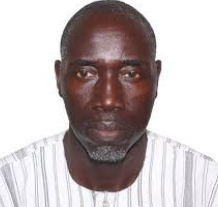
Professor Diouf holds a Doctorate in Natural Sciences from Cheikh Anta Diop University (UCAD) in Dakar and is a Full Professor at the Faculty of Science and Technology. He serves as Scientific Coordinator for Cégep de la Gaspésie et des Îles’ projects in West Africa.
Since 2010, he and his team have been actively researching indigenous knowledge systems, with a particular focus on coastal and marine environments. He supervised a doctoral thesis titled: “Local Knowledge and Traditional Management Practices of Marine and Coastal Natural Resources in Lower Casamance: Perspectives for Integration into Conventional Management Systems.” He is also co-author of several scientific publications in the field of ethnoecology, especially on sacred natural sites and traditional ecological knowledge in Casamance and the Saloum region.
The Feminist Climate Action in West Africa (ACF-AO) project is implemented by the Inter Pares–SUCO consortium in Senegal, Guinea-Bissau, Côte d’Ivoire, and Togo. It aims to strengthen the climate resilience of rural women and youth in ecologically sensitive coastal and island communities through:
In Senegal, local project partners—ENDA PRONAT, JVE, CNCR, APISEN, and SUNTAEG—are supporting the sustainable management of mangrove ecosystems in Community Marine Protected Areas (CMPAs) across the Casamance region (Abéné, Kalone Bliss Nassa, Ufoyaal Kassa Bandial, Niamone Kalounayes), as well as in the Palmarin Nature Reserve.
After two years of implementation with local communities, ACF-AO is now positioned to share key learnings that contribute added value to this colloquium. The objective of this presentation is to highlight the importance of indigenous conservation systems and local cultural values—particularly those carried by women—in the protection of mangroves in Senegal.
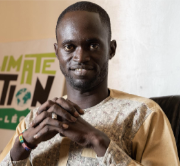
Djibny Niang is the Executive Director of JVE Senegal and National Coordinator of the Dakclim Platform. He holds a degree in renewable energy and is a committed advocate for climate action, biodiversity, and green jobs. He is also co-founder of Green Team Senegal and the founder of the SEN GREEN LABS incubator. A recipient of several awards, he works to promote an inclusive ecological transition in Senegal.
Mangrove ecosystems are rich, complex environments that play a vital role in maintaining coastal ecological balance. Beyond their ecological functions—such as serving as natural barriers against erosion and acting as carbon sinks—mangroves are also spaces where knowledge, practices, and traditions have been passed down through generations. These forms of local knowledge, often upheld by women and indigenous or rural communities, represent a living intangible heritage that contributes significantly to the conservation and sustainable use of these ecosystems.
Traditional mangrove management—through practices such as sustainable harvesting, community-led restoration, spatial organization of fishing grounds, and seasonal agricultural or spiritual calendars aligned with natural cycles—demonstrates a deep understanding of ecological and social dynamics. Though frequently informal, this knowledge complements and enriches modern scientific approaches.
This panel aims to explore how local knowledge actively contributes to mangrove preservation, while simultaneously enhancing community resilience, women’s leadership, and the intergenerational transmission of sustainable practices. The discussion will also address the enabling conditions necessary to recognize, value, and integrate this intangible heritage into public policies and conservation initiatives.
This panel aims to explore how local knowledge actively contributes to mangrove preservation, while simultaneously enhancing community resilience, women’s leadership, and the intergenerational transmission of sustainable practices. The discussion will also address the enabling conditions necessary to recognize, value, and integrate this intangible heritage into public policies and conservation initiatives.
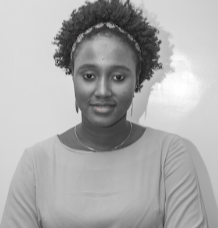
Dr. Mariama Diallo is a Senegalese socio-anthropologist specializing in conservation policy, local development, and governance. She serves as Project Coordinator at Nébéday, a Senegalese NGO committed to participatory natural resource management and environmental protection. Her work emphasizes the valorization of local knowledge, the co-creation of nature-based solutions, and the promotion of equitable natural resource governance.
She is deeply engaged in bridging traditional knowledge systems with scientific approaches, ensuring inclusive and community-driven environmental action.

Dr. Sanou Ndour is a biologist by training and holds a doctorate in Knowledge, Conservation, and Valorization of Biodiversity from Cheikh Anta Diop University of Dakar (UCAD). Prior to joining the IUCN Regional Office for West Africa (PACO) as Biodiversity Specialist for the Natur’ELLES project, Dr. Ndour served as Project Associate in charge of Monitoring, Evaluation, and Learning at Wetlands International Africa. She also worked as a Research Consultant for the Marine Turtle Survival Project in West Africa within the same organization.
Throughout her various roles, she has led the implementation of projects focused on the conservation of marine and coastal ecosystems in the West African sub-region. Dr. Ndour brings solid expertise in wetland management and the resilience of local communities dependent on biodiversity.

Prof. Malick Diouf holds a Doctorate in Natural Sciences from Cheikh Anta Diop University of Dakar. He is a full professor at the Faculty of Science and Technology and serves as the Scientific Coordinator for projects led by the Cégep de la Gaspésie et des Îles in West Africa.
Since 2010, Prof. Diouf and his team have been working extensively on endogenous knowledge systems. He supervised a doctoral thesis titled: "Local Knowledge and Traditional Management Practices of Marine and Coastal Natural Resources in Lower Casamance: Perspectives for their Integration into the Conventional System." He is co- author of several scientific publications in ethnoecology focused on endogenous knowledge and sacred natural sites in Casamance and Saloum.

Mr. Djibny Niang is the Executive Director of JVE Senegal and the national coordinator of the Dakclim platform. Holding a degree in renewable energies, he is actively engaged in climate action, biodiversity conservation, and the promotion of green jobs. He is the co-founder of Green Team Senegal and the initiator of the incubator SEN GREEN LABS. Awarded several prizes for his work, Mr. Niang advocates for an inclusive ecological transition in Senegal.
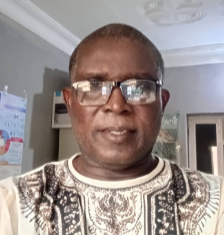
Mr. Omer Diedhiou is a key community development practitioner with extensive experience across various organizations. From 1986 to 2000, he served successively as Executive Secretary, President, and Training Officer of AJAEDO (Association of Young Farmers and Breeders of the Oussouye Department). Concurrently, he was the African coordinator of Catholic agricultural youth and an active member of their global coordination. Between 2006 and 2015, he collaborated with GRDR, Child Fund, and Caritas Ziguinchor. In partnership with the Mlomp community, he established the Kapac Olal Indigenous and Community Heritage Area (APAC), which he led until its integration into the Marine Protected Area in 2022. From 2015 to 2024, he joined the Oussouye Departmental Council as Head of the Environment and Sustainable Development Division and Project Manager. Currently, Mr. Diedhiou chairs the Management Committee of the Ufoyaal Kassa Bandial Marine Protected Area and the Casamance Mangrove Platform, actively contributing to ecosystem preservation and sustainable development in Casamance.
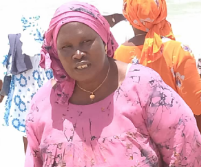
Mariama Thiaré was born in 1968 in Niodior, in the Saloum Delta, Senegal. After completing her studies in Dakar, she settled in Bambougar El Hadji. While working in the hospitality sector, she volunteered as a teacher to combat illiteracy, successfully mobilizing funds to build a school and recruit staff. In 2002, she founded the GIE Rogga Fakha, which today brings together 68 women engaged in activities such as agriculture, fishing, beekeeping, and processing, thereby securing their incomes. In 2022, she entered politics and became Deputy Mayor of Diossong.
She is also President of the Women’s Network of the Commune, the National College of Mango Processors, and the FAGIR Saloum Federation. Her career reflects a strong commitment to education, women’s empowerment, and sustainable management of local resources.